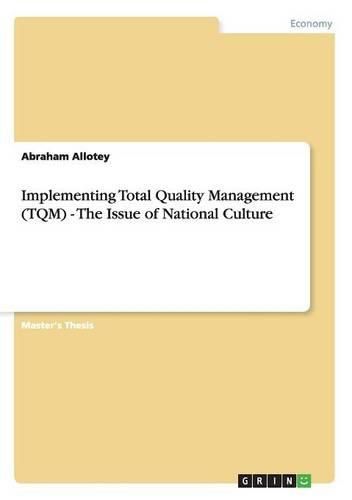Readings Newsletter
Become a Readings Member to make your shopping experience even easier.
Sign in or sign up for free!
You’re not far away from qualifying for FREE standard shipping within Australia
You’ve qualified for FREE standard shipping within Australia
The cart is loading…






Master’s Thesis from the year 2003 in the subject Business economics - Business Management, Corporate Governance, grade: 70%, University of East London (East London Business School), course: Master of Business Administration, 112 entries in the bibliography, language: English, abstract: Total Quality Management has worked in Japan, so why shouldn’t it work in the USA, Europe or Africa? This is a very popular statement amongst many multinational companies when they want to implement quality strategies in different countries. They usually ignore the importance of culture and its impact on transplanting quality strategies that has been successful in one cultural set up. This is one of the main reasons why TQM has not worked in many countries. The compatibility of TQM with different cultures should always be reviewed since work ethics for instance in Ghana is different from that in Japan. Culture reflects the way of life, values, and beliefs of a society and as such very difficult to change but rather can be slightly modified through education and training to adapt to certain quality management strategies. This claim of the impact of national culture, on the successful TQM implementation across national boundaries forms the basis of this management report. In this report therefore, literature on both TQM and culture will be critically discussed in the first two chapters. The third chapter will critically analyze the literature on the impact of culture in the successful implementation of TQM across different countries. Chapter four will analyze the managerial implications and finally a conclusion and recommendation will be drawn. […]
$9.00 standard shipping within Australia
FREE standard shipping within Australia for orders over $100.00
Express & International shipping calculated at checkout
Master’s Thesis from the year 2003 in the subject Business economics - Business Management, Corporate Governance, grade: 70%, University of East London (East London Business School), course: Master of Business Administration, 112 entries in the bibliography, language: English, abstract: Total Quality Management has worked in Japan, so why shouldn’t it work in the USA, Europe or Africa? This is a very popular statement amongst many multinational companies when they want to implement quality strategies in different countries. They usually ignore the importance of culture and its impact on transplanting quality strategies that has been successful in one cultural set up. This is one of the main reasons why TQM has not worked in many countries. The compatibility of TQM with different cultures should always be reviewed since work ethics for instance in Ghana is different from that in Japan. Culture reflects the way of life, values, and beliefs of a society and as such very difficult to change but rather can be slightly modified through education and training to adapt to certain quality management strategies. This claim of the impact of national culture, on the successful TQM implementation across national boundaries forms the basis of this management report. In this report therefore, literature on both TQM and culture will be critically discussed in the first two chapters. The third chapter will critically analyze the literature on the impact of culture in the successful implementation of TQM across different countries. Chapter four will analyze the managerial implications and finally a conclusion and recommendation will be drawn. […]